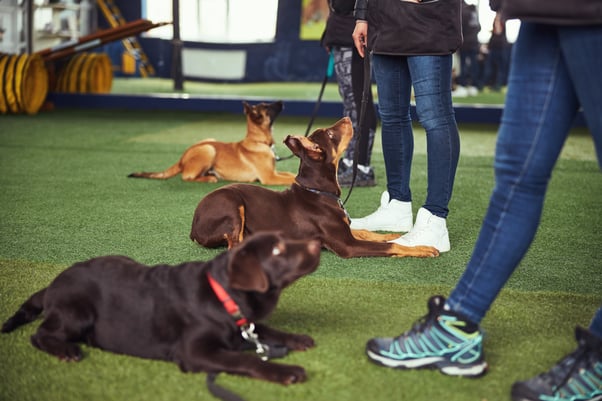You may have heard that to train your dog you have to be their pack leader, or that if your dog behaves in a certain way, it means they are dominant. But is this true? Let's take a look at these notions together and try to understand where this analysis of dog behaviour comes from, as well as its repercussions on the relationships we have with our dogs.
Early Studies of Dominance in Dogs
Initially, the notion of dog hierarchy came from a study carried out by scientists looking at wolves that did not belong to the same family group. From these observations, the scientists deduced that a linear canine hierarchy was established for the organization of the group. As for dogs, being a descendant of the wolf, they assumed the same logic also applied.
However, one of the people responsible for this study, David Mech, reviewed his own analyses several years later. His subsequent findings actually indicated that the wolves observed did not correspond to the natural model. Consequently, the conclusions of his observations could not be generalized to the species as a whole.
As a result of this new analysis, David Mech no longer talks about canine hierarchy in wolves. Instead, he talks about a family organization put in place for the survival, safety, and wellbeing of the group.

What's more, we now know that dogs are not descended from wolves at all. Dogs and wolves simply share a common ancestor. Similarly, we also know that the family structure in wolves is set up mainly for hunting and reproduction. Domesticated dogs on the other hand do not have to deal with these elements in their lives.
Dog Hierarchy – A Dated Concept
So, what does this mean for modern views of dominance in dogs? Well, imagining that dogs operate according to a hierarchical model is fundamentally eroded. And what’s more, reducing this operating model to the handler/dog relationship often leads to educational deviations and misinterpretations.
Let’s think about when your dog jumps up at you. If you are in the mindset that they are attempting to dominate you, and you react by putting them in a submissive position to re-establish the canine hierarchy, you are simply applying positive punishment. Positive punishment may eventually stop or reduce your dog’s behaviour, but it can also cause stress to your dog.

As you will have realized, the important thing is not just to achieve a result but to take into account the path taken to achieve that result. Also, just because something works, this doesn't mean it's good. In fact, obtaining results should never convince you that your theory was right. To know whether your analysis is appropriate, it's the whole process that needs to be taken into account.
In short, the logic of canine hierarchy does not apply to dogs, especially if you understand their learning mechanisms. Instead, we should try and understand the true nature of dog behaviour.

Beware of Labels
In dog training, you have to force yourself to identify the situation as objectively as possible. However, we often tend to put labels on dog behaviour rather than describing their behaviour in a neutral way.
For example, saying that your dog is stubborn is not helpful. By saying this, we are not describing a dog behaviour at all. Instead, we are simply making a judgement about their behaviour, and more importantly, not making an effort to understand why they are behaving in a specific way. Proceeding in this way prevents us from being effective in educating or rehabilitating dogs.
So How Should You Behave Towards Your Dog?
Your dog is a living, emotional being with their own specific characteristics. When adopting a dog, bear in mind that you need to discover and understand a whole other species, as well as get to know a new individual. It's up to you to find out what makes your dog tick and define your life and experiences together. It's really exciting to discover what motivates your dog and to learn how to use this motivation to put training in place, making life with your dog pleasant and reassuring.
Are you interested in learning more about dog behaviour from our team of Happy Dog Experts? Check out all our articles online! You can also get in touch to ask any questions, or stay informed with our latest tips, advice, and Q&As, by signing up to our newsletter.


